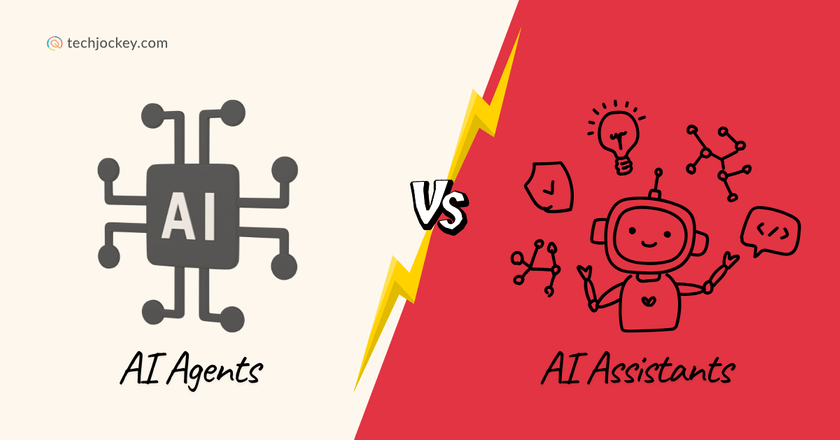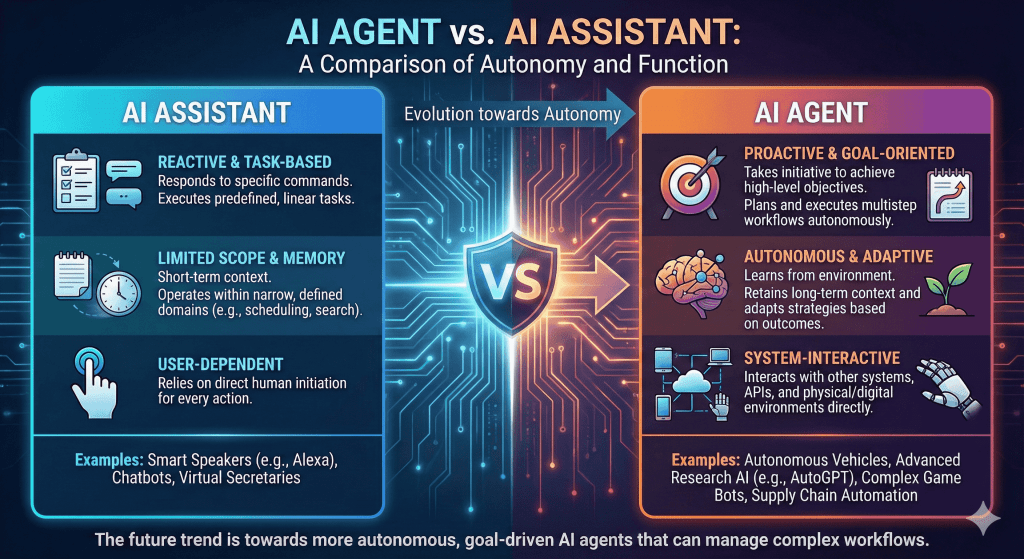AI Agents vs AI Assistants: Which One Will Lead the Future of Automation?

Today, artificial intelligence is everywhere. It powers apps, automates workflows, and even makes decisions for us. But not all AI programs work the same way. Case in point: AI agents and AI assistants. While the two might sound similar to many, they are completely different in how they operate.
An AI assistant, for instance, acts as an aid. It waits for your command, answers questions, and keeps things simple. AI agent, on the other hand, is a strategist of sorts. It thinks, acts, and achieves goals without waiting for instructions. One follows, the other leads.
So, which one should you trust for your business or daily life? Let’s deduce as we shed light on the key differences between AI agents vs AI assistants, one key aspect at a time!
What are AI Agents?
AI agents are automated programs that do tasks on their own. They can learn, adapt, and work without constant instructions. Think of them as workers that observe, decide, and act without waiting for human help.
However, the degree of autonomy can vary depending on how they are designed. In real business environments, AI agents still operate under defined rules and require human oversight to ensure safe, compliant, and predictable decisions.
AI agents follow a goal-oriented approach. They don’t just execute instructions they identify objectives, plan the best route to achieve them, and take actions that deliver measurable outcomes efficiently.
AI agents can, for instance…
Monitor systems to spot problems early.
Track warehouse stock and predict when to reorder.
Trade in financial markets using trends from data analysis.
The highlight of AI agents is independence. For once set up, they continue working on their own and finish complex tasks in a timely and efficient manner, something humans would take a lot of time to accomplish. They make decisions using data, learning algorithms, and sometimes, even simulations to predict outcomes and choose the best action.
In many organizations, AI agents now operate behind the scenes and even power AI assistants automating logic and workflows while assistants handle the communication part.
Suggested Read: AI Agents Revolutionizing Business
What are AI Assistants?
AI assistants are programmed to help people by responding to requests and completing tasks. Unlike AI agents, they need human input to guide what they do. Their main goal is to make work easy through communication, organization, and quick access to information.
Some everyday AI assistants you may know include…
- Calendar helpers that schedule appointments after you share your availability.
- Chatbots on websites that answer customer questions in natural language.
- Voice assistants that set reminders, play music, or send messages.
All in all, AI assistants act like interactive companions. They understand natural language and use chat-like interfaces to talk with users, answer questions, and follow instructions. Their success depends on how well they understand what you want and give quick, helpful responses.
Differences Between AI Agents and AI Assistants
| Aspect | AI Agents | AI Assistants |
|---|---|---|
| Level of Autonomy | High autonomy; goal-driven decisions | Act only on user commands |
| Interaction Style | Operate in the background | Conversational and user-facing |
| Learning | Improve strategies based on data | Learn from user interaction patterns |
| Use Cases | Inventory, automation, cybersecurity | Customer support, productivity tasks |
| Human Dependency | Minimal supervision required | Heavily dependent on input |
| Business Fit | Autonomous workflow automation | Enhancing user experience |

AI Agents vs AI Assistants: A Detailed Feature Comparison
To make it easier to understand how AI agents and AI assistants differ, let’s explore several key areas that distinguish them…
1. Level of Autonomy
AI agents operate with a high level of autonomy. Once active, they monitor environments, analyze data, and carry out decisions without human guidance. Their role is to make choices that achieve goals set by their programming or training.
By contrast, AI assistants depend largely on human interaction. They wait for users to ask for help or give commands before acting. Their role is to respond and assist rather than initiate actions independently.
2. Interaction with Users
AI assistants focus on communication. They talk with users, answer questions, and give real-time help through voice, text, or visual interfaces. Their value depends on how well they understand requests and respond quickly.
AI agents work mostly in the background with little direct contact. They act based on conditions or new inputs from their environment. They don’t chat but may send alerts or reports when tasks are done or problems occur.

SemantiQ
Starting Price
Price on Request
3. Learning and Adaptability
AI agents can learn and adapt from experience, which helps them improve over time by detecting patterns and adjusting strategies. For example, an agent managing inventory could get better at forecasting by learning from sales cycles and seasonal trends.
AI assistants also learn from conversations and user interactions to give better answers or suggestions. While AI assistants can automate certain workflows, they only do so after being triggered by a user or predefined rule. They do not make autonomous decisions or improve processes on their own.
However, their learning is based on user behaviour data and focuses on improving satisfaction and understanding requests, not on autonomously improving processes.
4. Use Cases and Applications
AI agents excel in managing complex operations that need quick reaction and ongoing adjustments. You will find them in settings such as cyber security, financial trading, autonomous vehicles, and smart manufacturing.
AI assistants, on the contrast, are ideal for roles requiring interaction and response. They play a big role in customer service, personal productivity tools, virtual receptionists, and automated help desks. Any situation where human dialogue adds value is favoured by assistants.

SleekFlow
Starting Price
$ 129.00
5. Dependency on Human Input
AI assistants need humans to tell them when and how to act. They do not perform tasks on their own and rely on clear commands or questions to provide help. Even when AI assistants automate tasks, the automation still depends on user prompts or preset routines they do not take independent decisions like AI agents.
AI agents, contrarily, perform their duties without needing frequent input. Once deployed, they observe, decide, and act independently. Human involvement might only happen during configuration, updates, or reviewing results.
AI Agents vs AI Assistants: Which One Should You Choose?
Choosing between AI agents and AI assistants depends on what you want to achieve and how your workflows are structured. Here are some decisions to consider…
If you wish to have automated systems that operate continuously and with little to no human supervision, AI agents are the way to go. They help reduce manual effort and respond quickly to changes.
If you want to support teams or customers by making communication easy and helping with routine tasks, AI assistants fit better. They enhance user experiences and help people and technology interact better.
In many cases, companies combine both as well. AI agents can work behind the scenes to handle heavy lifting and alert human workers or AI assistants when intervention or communication is necessary. AI assistants then carry conversations and provide guidance or options for next steps.

Rocketium
Starting Price
Price on Request
Conclusion
Knowing the difference between AI agents vs AI assistants can help you choose the right tool for your needs. So, ponder over your business environment, task requirements, and interaction needs to settle the debate once and for all.
If you find yourself struggling still, contact the Techjockey team to clarify your doubts and finalize the best solution your business needs.
Yashika Aneja is a Senior Content Writer at Techjockey, with over 5 years of experience in content creation and management. From writing about normal everyday affairs to profound fact-based stories on wide-ranging themes, including environment, technology, education, politics, social media, travel, lifestyle so on and so forth, she... Read more




























